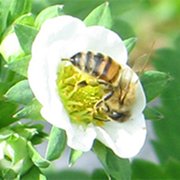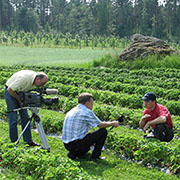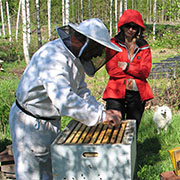BICOPOLL



More about the project
Main results and conclusions
The BICOPOLL project has been completed according to the original plan, and in many instances, much more has been achieved than what was originally anticipated. Pan-European field trials have consistently shown, using strawberry as a case study, that bee-disseminated biocontrol of the grey mould provides equal or better crop protection than chemical fungicides. In organic strawberry, marketable yields significantly increase, often by over 50 %. Improved pollination accounts for about half of the yield increases. Honey bees, bumble bees, and solitary bees can all be used for vectoring beneficial biocontrol microbes Efficacy and impact of the entomovectoring technique can be improved by management of hives (size, location, and properties), vegetation management, and optimization of dispensers and properties of the microbial preparate. No negative outcomes on products (berries, bee-products) have been detected, nor on humans or non-target organisms; properties of the carrier material and its particle size need to be optimized to ensure harmlessness to the bees themselves.
The concept has proven to be effective on a wide range of crops, such as strawberries, raspberries, pears, apples, blueberries, cherries, and even grapevine.To make full use of the entomovectoring technique, organic berry and fruit growers are recommended to (i) keep bees themselves, or to hire the service from beekeepers for entomovectoring; (ii) manage vegetation within and around the target crop to support the activity of bees and other pollinators, which can help to disseminate the beneficial microbes within the crop. Beekeepers are recommended to market pollination and biocontrol services to fruit and berry growers, and in the management of bees and the dissemination activity to ensure that all operations are optimized for efficacy. Biocontrol product manufacturers are recommended to develop products and their formulations specifically for entomovectoring, because current formulations are optimized for other uses. Administrators are recommended to register, and to promote the registration of biocontrol products, which are needed for effective control of the target diseases and pests amenable to entomovectoring – in all countries (lack of registered products is a major bottleneck to adopting these techniques more widely).
All project results are globally applicable. On-going collaborative research using these techniques and/or their modifications has been started in Australia, and collaborations are emerging in South-East Asia, South- America, the Caribbean, South Africa, and in Central Asia. Experience in Finland shows that entomovectoring can easily be integrated also in conventional production of strawberry, and currently well over 10% of Finnish strawberry growers use the method. Its use is anticipated still to rise rapidly in Finland, and in countries where the biocontrol product is registered (Estonia, Sweden, Belgium).
Important aspects for future development include assuring the availability of healthy bees for entomovectoring, in particular honey bees free of varroa; investigating the behavior and visitation of bees in specific wind-pollinated crops, and possibilities to steer bee foraging activity in these crops; and possibilities to improve bee activity and health via vegetation management (e.g., provision of flowering plants at strategically important locations and times during the year).
BICOPOLL
| 7 partners, 7 countries
Coordinator Professor Heikki Hokkanen, University of Helsinki, Department of Agricultural Sciences, Finland. |
Project stakeholders
The BICOPOLL project addressses stakeholders from all countries. The project is especially relevant to the following target groups:
- Organic berry growers
- Beekeepers
- Plant protection scientists
- Advisory services
- Biocontrol manufacturers
- Policy makers.